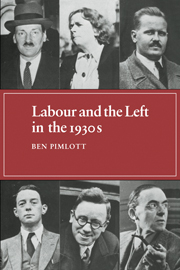Book contents
- Frontmatter
- Contents
- Dedication
- Acknowledgements
- Glossary of initials
- 1 Introduction
- PART ONE LABOUR AND THE CRISIS
- PART TWO UNITED FRONT
- PART THREE RANK AND FILE
- PART FOUR ALLIANCE
- 15 Popular Front
- 16 Labour and the Left Book Club
- 17 Parliamentary Alliance?
- 18 Cripps and the Petition Campaign
- 19 Labour and the War 1939–40
- 20 Conclusion
- Appendix
- Notes
- Bibliography
- Index
- Frontmatter
- Contents
- Dedication
- Acknowledgements
- Glossary of initials
- 1 Introduction
- PART ONE LABOUR AND THE CRISIS
- PART TWO UNITED FRONT
- PART THREE RANK AND FILE
- PART FOUR ALLIANCE
- 15 Popular Front
- 16 Labour and the Left Book Club
- 17 Parliamentary Alliance?
- 18 Cripps and the Petition Campaign
- 19 Labour and the War 1939–40
- 20 Conclusion
- Appendix
- Notes
- Bibliography
- Index
Summary
Might the Labour Party in the 1930s have been used as an instrument for aiding the unemployed at home, restraining fascism abroad, or making a significant step towards the achievement of socialism? The answer of this book is that opportunities existed but were wasted –partly because of leftwing pressures which, so far from encouraging brave initiatives, inhibited the Party leadership and restricted its room for manoeuvre. Such a view is opposed to the argument of marxist historians that Labour's failure reflected the ‘tentative and doctrinaire’ nature of Labour socialism, ‘an overriding commitment at all levels of the Party to Parliamentary politics’ and a consequent failure ‘to politicise a depressed and potentially militant workingclass in more than the requirements and ethics of electoral politics’.
For those whose approach is revolutionary (in the sense of a belief that the pursuit of a fundamental transformation of society should normally take precedence over other aims) a case can be made for the second indictment. It can be pointed out that Transport House rejected any strategy aimed at creating in the workers a realisation of their own power; that the TUC followed the Mondist doctrine of cooperation with Government and employers, preferring local unemployed associations to hunger marches, recreational facilities for the out of work to industrial action; and that it was left to the Communists to organise the unemployed, and (through the Communist-inspired Left Book Club) to discover and cater for a mass demand for socialist political education.
Yet Labour has never been a revolutionary party, and revolutionary socialists among its members have never been more than a tiny minority.
- Type
- Chapter
- Information
- Labour and the Left in the 1930s , pp. 194 - 203Publisher: Cambridge University PressPrint publication year: 1977



